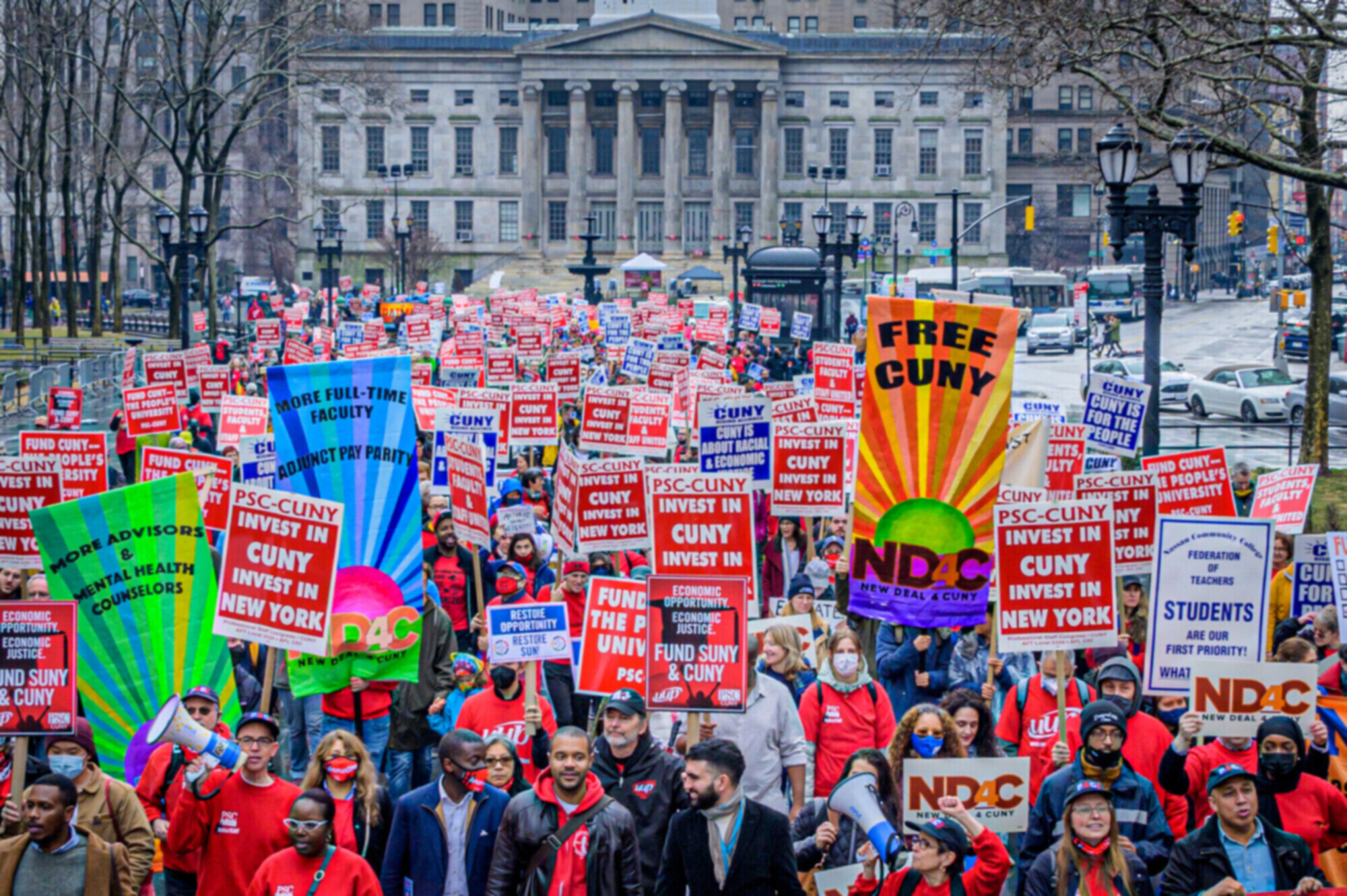Efforts to destroy public-sector unionism, especially in the teaching profession, have reached a fever pitch. Nationally, the US Supreme Court is due to decide Friedrichs v. California Teachers Association. If the Court’s conservative majority prevails, this case could decimate public sector unions’ ability to bargain collectively by stripping away vital funds currently collected from all employees represented by the union to cover the cost of the union’s work. see (“Religion behind anti-union SCOTUS case”). Conservative governors in several Midwestern states have already enacted similar measures, starving unions of funds and weakening the bargaining power of workers.
Anti-Union Environment
Most disturbingly, however, anti-unionism is not only the purview of conservatives in faraway places like Wisconsin, but is making significant inroads in the purportedly union-friendly state of New York. Opponents of teachers’ unions, backed by organizations bankrolled with corporate dollars, have filed a lawsuit, Wright v. State of New York, to eliminate teacher tenure.
Democratic Governor Andrew Cuomo has expanded the number of non-union, corporate-sponsored charter schools. He and SUNY
administrators demanded a contract for SUNY faculty and staff that included unpaid furloughs, benefit givebacks and meager wage increases that fail to keep up with inflation.
The Power of Collectivity
Cuomo’s stalling on the “maintenance of effort” bill to fund basic cost increases – which, at press time, he had yet sign – and his refusal to adequately fund CUNY so that CUNY employees can have a fair contract are the latest glaring manifestations of the anti-unionism that has infected New York, the state with the highest union density in the nation. In this political climate, it is more important than ever for PSC members to raise their union consciousness and engage in greater union activism.
In the face of such recalcitrance by elected officials and CUNY management, CUNY faculty and staff have been working without a contract for over five years and without raises for six. It will take a concerted effort from an activist membership to win a respectable contract that preserves the hard-earned gains of the past and secures improvements for the future. In this effort, it will serve PSC members to revisit the benefits, individual, collective and social, that union membership affords CUNY faculty and staff. Although members may not always be completely satisfied with the results of the contract reached between CUNY and the PSC, having a union that bargains collectively and, when necessary, exerts pressure on CUNY and elected officials to provide employees with a space, an accessible process, and collective strength for employees to bargain with their employer is critical to ensuring the quality of the education our students deserve.
Social unionism is a key aspect of the PSC and its forward-thinking orientation. It links the union — with its numbers, its political influence, its resources (both material and in human capital) — in solidarity with the struggles of our students, their families, and the community (both local and global). Social unionism, especially in this anti-union political environment, is not merely an expression of humanitarianism, but an attempt to build alliances with the communities we serve and live within – which is a necessary counterweight to the divide and conquer tactics of the keepers of the status quo.
A casual perusal of Clarion will show that over the years the PSC has been active on a whole host of social justice issues, including in post-earthquake Haiti, in demonstrations for racial justice and against police brutality, the Fight for $15 movement, the People’s Climate March, and the end to tuition increases at CUNY, just to name a few. The PSC’s activities on these issues embody Martin Luther King’s famous dictum:
Injustice anywhere is a threat to justice everywhere. We are caught in an inescapable network of mutuality, tied in a single garment of destiny. Whatever affects one directly, affects all indirectly.
Member Activism Is Key
As the PSC increases pressure on CUNY administration and elected officials to win a contract that affords faculty and staff the salary increases they have earned and improves upon the gains of the past — a contract that recognizes the positive social contributions that CUNY faculty and staff make to the present and future well-being of the residents of the city and state of New York — the mobilization and activism of the PSC membership, along with the support of CUNY students, is of primary importance. Contact the chapter chairperson on your campus to get more involved in the PSC.
______________________________
Peter Kolozi, associate professor of political science, and Brandi Rima, assistant professor of psychology, teach at Bronx Community College.

